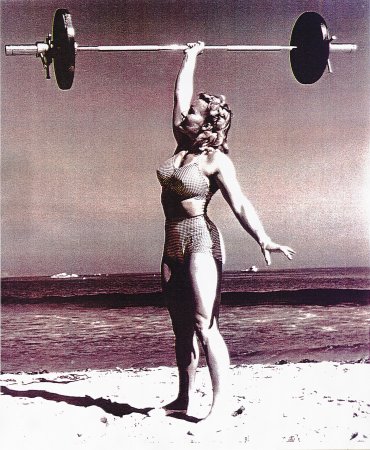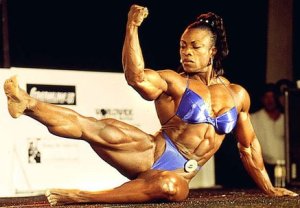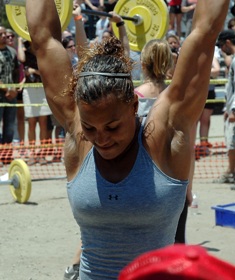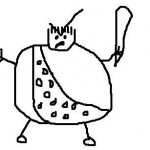Possible trigger warning: This post contains some profanity, and is written for those members of my audience whose physical abilities allow them to play active sports or lift heavy weights, especially women interested in trying weight lifting.

I’ve often remarked on the way the modesty doctrine made me think of my body as a decoration – and a flawed one, at that. I was supposed to be pretty but not sexual, which to me meant starving off all curves and remaining a perpetual prepubescent girl. I was taught to self-objectify (to always see myself through the eyes of potential male observers). I’m far from alone in the damage I did to my body and mind because of this self-objectification:
Self-objectification is a process by which girls learn to think about their own bodies as objects of other people’s desires. Instead of appreciating the body for its abilities, its strengths or its pleasures, a person sees it as something for other people’s enjoyment. Multiple studies have linked self-objectification with an increase in rates of depression, anxiety and eating disorders as well as lower academic achievement. (From Psychology Today: “Hey Baby” Hurts, an article primarily focused on street harassment of teenage girls.)
I no longer think this way, but it’s been the single hardest legacy of my fundamentalist years that I’ve had to overcome. It has taken me years. I think I’ve mostly arrived, but every now and then I snap back and have to re-teach myself how to think about my body. Most days, though, I’m there. I’m valuing myself for things other than what I look like. One of the greatest strategies I’ve found for loving my body is doing a sport.
My sport of choice is weightlifting.
(By the way, watch this woman pick up one end of a car. She rocks!)
Just this morning, I pulled off a 100lb squat for the first time! I’ve already reached a bodyweight deadlift. For those who aren’t familiar with the lingo, the former means I load up a barbell totalling 100lbs and squat straight down and back up again, like a toddler grabbing a block off the floor. The latter means I do this with a loaded barbell weighing the same as me.
Growing up fundamentalist and having no gym access or instruction, I had never even thought about how much weight a woman could lift. It didn’t even occur to me that human beings could lift more than they weighed at all. Watching a woman lift 460lbs (video) would have been an entirely novel and awe-inspiring experience to me. It still is, a little bit. I mean, 460 pounds!
The truth is, ordinary human beings can get incredibly strong. Olympic powerlifting women can lift over 500lbs at once. Women can even continue lifting weights during pregnancy, which tends to result in a faster, easier labor and healthier baby than average. Oh, and it can help you bounce back pretty quick, too. (Note: Your mileage will vary. Pregnancies are very individual matters.)
Now, let’s dispell a Whole Lotta Myths that come up when most people encounter women lifters for the first time. The myths? That lifting will turn you into The Hulk and your husband will leave you because you look like a dude, and you won’t be able to wear cute dresses anymore and ugh… Well, you get it. Here are my answers:
1. No, you won’t get huge (unless you really, really try and pop steroids).

Professional bodybuilders like the woman on the left do intensive, specific exercises meant to make those muscles pop. Their diets are fine-tuned so that every morsel helps them bulk up. They take supplements. Many of them take steroids. They work under professional bodybuilding trainers hours and hours out of every day. Finally, during competition season, they slim down to such low bodyfat levels that they literally can’t sustain them for more than a few months. They wind up getting easily dehydrated and sometimes even require oxygen! During off-seasons, they put the fat back on and just
look thick. So yeah, ladies, you’re not going to look like the woman on the left by accident.That said, let’s stop and think critically for a moment about why looking like that is discouraged. Female bodybuilders, probably better than any other athletes, demonstrate just how much male and female bodies have in common. Both sexes can be strong, ripped and powerful. Why is a body like that encouraged on a man but discouraged on a woman? Why do we see one as buff and attractive and the other as “gross” (as I’ve heard some of my friends unfortunately say when they put on a little muscle)? Why are women’s bodies not admired for their power and strength, but for softness and delicateness?

If it’s God’s will, I ask you why God wants women to be weak. If it’s “nature,” I ask you why we’re capable of strength and refuse to use it? I think it’s all about patriarchy. The male ideal is the muscle-bound protector. The female ideal is the soft, delicate protected one. Which is all kinds of bullshit, because a woman who can defend and protect herself is much safer than a woman who would never pick up anything heavier than a 5lb dumbbell lest she get “bulky.”Now, gender politics aside, if you want to train with weights but are afraid of bulking up, have a look here (video). Also watch this 125lb woman lift 345lbs (video).
2. Women do not need to train differently from men. Period.
The men who are most successful at weight lifting tend to use free weights – barbells and dumbbells with plates – rather than those complicated exercise machines. There is absolutely no reason a woman can’t do the same weight lifting routine.In the lifting world, the “big three” exercises are the squat, deadlift and bench press. Lifters add up the total weights of each to get the number they use to measure their progress. Mine isn’t all that high yet (320lbs) but I do know some women in the 700lb-range. These exercises are extremely efficient for the whole body, so you can get perfectly fit by just doing those three plus a cable or barbell row for your upper back. I love the simplicity of lifting.

The bottom line is that there is no physiological reason for women to forego lifting the way men lift. I am lucky enough to have a female lifting partner now, but when I go alone I tend to be the only woman in a sea of men. The biggest obstacle to women getting strong is not trying in the first place. It makes sense that men have cornered the market on the exercises that build strength the most effectively. Women are finally starting to find out that they can benefit, too.
Note: I don’t judge you if you’re not into athletics. Not at all. Just please, never discourage a woman who wants to work out because she might “get big” or “hurt herself.” That’s just foolish. Also, please don’t do what this guy does, shaming other men because “Somewhere out there, a little Chinese girl is warming up with your max.” This shaming works only because men are trained to believe that they must be stronger than all women. This is misogynist (and racist, too). A strong woman is a strong woman. It’s good for her. It is not evidence of your own emasculation. This attitude is partly responsible for the way women end up segregated in the cardio room while men build strength; if men welcomed strong women, rather than using them as examples to shame other men, more women would feel comfortable in the weight room.
3. Weight lifting is a relatively safe sport.

You’re more likely to get injured in any other sport than weightlifting with proper technique.
It takes some getting used to, but if you listen to your body, it’ll tell you when something is wrong. And if you’re really worried, check out the From Dork to Diva series from Krista Scott-Dixon. She’ll show you what not to do and then what you should do instead. Also, google up those obnoxious black-tinted powerlifting websites and read their tips on form (but don’t obsess over it if you’re a beginner – the tips can be more intimidating than the weights if you start thinking all of them are Matters of Life and Death.
4. Weight lifting can help you lose weight, even without hours of cardio.
Muscle burns more calories than fat. It also takes up less space. That means that if you eat the same amount of food and put on muscle, you’ll probably lose fat (from extra calories burned) and be slimmer (because muscles are dense and compact) even if the number on the scale doesn’t change.
I hate running. HATE. RUNNING. So I don’t do it anymore. I walk. I lift. I eat. Life is good.

What does this have to do with the modesty doctrine?
Weight lifting has caused me to respect and admire my body for what it can do. The only weight on my mind is the weight on the barbell, not on my thighs. (It’s just a nice side benefit that lifting heavy enough will probably make you – and me, if I’m lucky – smokin’ hot, too!) Weight lifting has reminded me that I have real, physical power – the kind the Christian patriarchy movement didn’t want me to know I had.
Now, if a guy leers at me on the street, I’m more likely to think “I can take you, arsehole,” than “Oh no! I just sent another man to hell with my boobs!” I’m sure the Ladies Against Feminism would be horrified, but you know what? It’s called confidence. It’s good. It’s healthy. It may also keep me safe, by making me look less vulnerable (because I am less vulnerable).
The Moral of the Story
One of the best antidotes to the modesty doctrine and the self-hatred it causes is doing some kind of sport that challenges you physically and mentally. When you earn an achievement in sports, no one can take that away from you. When you hide in sack dresses, though, men can still take away your confidence by leering. When you lift something heavier than yourself, you realize that women’s bodies weren’t made weak by God, but by patriarchy. You realize that your body is not just about sex or attraction. When you run fast, or bike a challenging hill, or do a pull-up for the first time, you realize that your body is made for movement – glorious movement – and that staying at home and draping yourself in modest, feminine dress are actually strategies that Christian patriarchy uses to keep you weak.
Christian patriarchy teaches that the human body is a source of shame. Immodesty (whatever that is) is “shameful,” they say. Bullshit. If you believe that God designed the human body, with all of its potential, to be slowed down and wrapped up and immobilized by clothing and social regulation, you should re-examine your God’s head. How dare you keep women weak in the name of God? Although I no longer believe in a formal creed or Godhead, I do believe that if there’s a Creator with his fingerprints on our DNA, then he (or she!) intended for us to use our bodies to their fullest potential, to delight in our strength and speed and run wildly through fields like children. You can’t do any of those things if you’re worried about your damned skirt.
Finally, I believe it is immoral to prevent women from building their strength.
It is immoral to teach women to be ashamed of their bodies or to describe the very muscles that give them movement and power as “gross” or unsightly.
It is immoral to teach a beauty standard that values weakness and emaciation over power.
It is immoral to teach girls that beauty itself is more important than strength.
Now, get out there and kick some ass.















